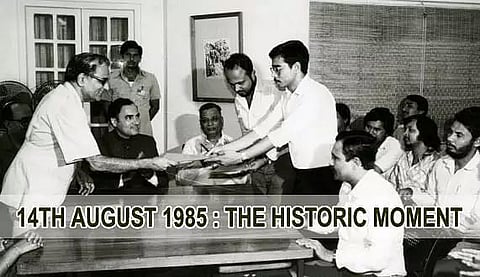
- Home
- Live Blog
- Breaking News
- Top Headlines
- Cities
- NE News
- Sentinel Media
- Sports
- Education
- Jobs

The Assam Accord was a political consensus and a national commitment for finding a permanent solution to the problem of unabated influx of illegal Bangladeshi migrants changing Assam's demography and posing existential threat to Assamese and other indigenous people. The bitter truth is that the core clauses of accord continue to be embroiled in complexities of cut-off dates even after three-and-a-half decades of signing of this historic accord on the midnight of August 14, 1985. The clause 5 of the accord defines who is an illegal migrant in Assam. Therefore, the cut-off date of March 24, 1971 for identification of illegal Bangladeshis, irrespective of their religions, set in this clause, formed the basis of updating the National Register of Citizens (NRC), 1951. Political consensus evolved that updating the NRC 1951 will help identification of genuine Indian citizens in accordance with the provisions of this clause and this will make identification of illegal migrants easier as they would be excluded from the final updated list after disposal of all claims and objections. Legal complexities are still far from over. Disposal of claims and objections is going to be long drawn judicial process as number of excluded NRC applicants is as high as 19.06 lakh. The gigantic exercise was carried out under constant monitoring of the Supreme Court as the governments at the Centre and in the state were dithering on updating the citizens' register in the state. Enactment of the Citizenship (Amendment) Act, 2019 has only added to the complexities as it grants the Central government the power to grant citizenship to Hindu and other non-Muslim illegal Bangladeshi migrants who came to the state or other parts of the country till December 31, 2014. The CAA, 2019 has created the complication of determination of citizenship in Assam on basis of two cut-off dates. The sanctity of the cut-off date of March 24, 1971 in the core clause of the Assam Accord is a now a legal issue pending before the Supreme Court. Ironically, for the governments at the Centre, be it United Progressive Alliance government headed by the Congress, National Democratic Alliance government headed by the Bharatiya Janata Party (BJP) or the United Front government of the non-Congress, non-BJP parties, the implementation of the accord remained a political ball game and a conduit of garnering electoral support with promises. The Central Government's lack of interest in accepting and acting on the report of the High-Level Committee on Clause 6, another core clause of the accord is another example of New Delhi keeping implementation of the core clauses on the back burner. While there is no official word from the Central government on the report made public by the AASU, Assam Health and Finance Minister Himanta Biswa Sarma's insisting that the cut-off date of January 1, 1951 recommended by the committee for deciding the definition of Assamese people in respect of the clause 6 involves complexities of proving the residency claims pertaining to this date tells about the reservation of Dispur on the recommendations. Sarma also insisted that the Assam Assembly will have to first decide the definition of the Assamese people in respect of this clause which promises constitutional, legislative, and administrative safeguards for Assamese people. Reservation of the BJP-led government in the state over this cut-off date explains why New Delhi is going back on its commitment to implement this core clause even though the committee was constituted by the Ministry of Home Affairs. Chief Minister Sarbananda Sonowal has assured that his government is committed to implementing the clause 6 and would never compromise on it. However, his assurance has failed to cut much ice as the issues of constitutional and legislative safeguards by way of reservation of seats in parliament, assembly come under the purview of the Central government and the state is not empowered to take any decision on these matters. The Central government can clear the air by clarifying its position on the recommendations of the committee on clause 6 as well as on the clause 5. Time-bound implementation of the Assam Accord should not remain a promise. Delay in implementation of the core clauses of the accord will not only further complicate determination of citizenship in Assam, it will also expose deep religious and linguistic faultiness in the state. It is time New Delhi seriously reflected why the people of Assam are still on the streets raising the same demands – detection of illegal Bangladeshi migrants, deletion of their names from voters' list and expulsion of the identified illegal migrants. The writing is on the wall for Delhi and Dispur. Assam Accord will be pushed into a labyrinth of cut-off dates if the period of uncertainty in implementation of the core clauses of the accord gets further extended.